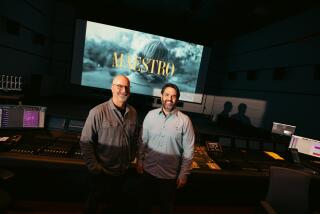Cracking the Caper Code
- Share via
Nick Wells is Mr. Careful. He hasn’t made it to the pinnacle of the safecracking world by being hot-headed or impulsive. The man is smooth, solid, the epitome of professionalism, and “The Score” does so well detailing what Nick hopes will be his last job because it’s as prudent, methodical and frankly old school as its protagonist.
A top-drawer heist movie that ratchets up the tension inch by careful inch, “The Score” will remind you of classic caper films of the past, and that is a good thing. Engrossing and diverting, it shows how simple it can seem to make a satisfying and adult entertainment if you pay attention to the right things.
That means first of all a more-than-respectable script, credited to four writers (story by Daniel E. Taylor and Kario Salem, script by Salem and Lem Dobbs and Scott Marshall Smith) who thankfully didn’t get in each other’s way. Although a high-stakes burglary is at the film’s heart, this is as much a character study as a thriller, so having a trio of exceptional actors, in effect representing three generations of performers, is a powerful plus.
Robert De Niro, the model of on-screen proficiency, plays the phlegmatic Nick, enmeshed with both Max, his fey older fence, played by Marlon Brando, and Edward Norton’s Jack Teller, the young and restless new thief on the block. These actors not only enlivened the script with occasional improvising, they also brought their own particular gifts and styles to the table and inevitably sparked to one another’s presence as well.
To make this ensemble work at its best, a director was needed who wasn’t afraid to be traditional, restrained, even old-fashioned. Surprisingly, that turned out to be Frank Oz, who started with the Muppets and whose career has been devoted to comedy ever since. Who would have guessed that lurking inside the man who lurked inside Yoda and Miss Piggy was a thriller director eager to get out?
“The Score” opens with De Niro’s Nick on the job, breaking into a safe under conditions that show him to be completely unflappable even in the most stressful situations. As he makes his way home through a carefully worked out escape route, we see both the steeliness that we come to understand characterizes Nick as well as why he believes that in his business, “Talent means nothing. Lasting takes discipline.”
Home is Montreal, where Nick runs a successful jazz club as a cover (Mose Allison and Cassandra Wilson make cameo appearances) and maintains a no-strings “I’ll see you when I see you” romantic relationship with a sophisticated flight attendant named Diane (Angela Bassett).
It’s one of Nick’s many rules never to do a job in the city where you live, but his resolve is tested when Max comes to him with the opportunity for one last multimillion-dollar score. Sitting inside the well-fortified, heavily guarded Montreal Customs House just happens to be one of France’s national treasures, a rare royal scepter that will fetch a mighty ransom from an eager buyer. It is, says Max, the opportunity of a lifetime.
The showy, flamboyant Max, given to rakish hats and canes, is not the role of a lifetime--it’s more in the nature of an amusing cameo--but it is still marvelous to see what Marlon Brando does with it. At this stage of the game, acting seems like something of a well-paid diversion for Brando, but even when, as here, he’s only taking it partially seriously (which for him is a lot), he’s awfully good at it. Once Brando gets in front of the camera, he can’t not act, even if he doesn’t feel like it. Even when he’s doing nothing, he’s doing something, and its always fascinating to see what that something is.
The third member of this criminal triangle is Norton’s Jack, the job’s inside man, who pretends to be mentally impaired to get work as the Customs House’s assistant janitor. Norton is an enormously gifted young actor, and he’s able to give Jack levels and colors he might not otherwise have, turning him into someone who is as earnest and needy of respect as he is cocky, insistent and almost charming.
Naturally, things being as they always are in the world of movie heists, nothing but nothing goes as anticipated for this trio. The plot’s wrinkles get wrinkles, wheels spin inside wheels and a variety of ancillary characters (Jamie Harrold’s computer nerd is especially memorable) get drawn into the mix.
Although you might sometimes wish that Oz’s direction was a tiny bit jazzier, he in general handles the material just right. The characters’ motivations are plausible, the film’s jazzy soundtrack is appropriate, and even the safecracking tools Nick uses are as complex as a heart surgeon’s. “If somebody built it, somebody can unbuild it” is one of his maxims, and in the end, “The Score” leaves us wondering why so few people are willing to build films like this one anymore.
* MPAA rating: R, for language. Times guidelines: Tense but genteel and surprisingly nonviolent.
‘The Score’
Robert De Niro: Nick
Edward Norton: Jack
Marlon Brando: Max
Angela Bassett: Diane
Gary Farmer: Burt
Paul Soles: Danny
Mandalay Pictures presents a Horseshoe Bay/Lee Rich production, released by Paramount Pictures. Director Frank Oz. Producers Gary Foster, Lee Rich. Executive producers Bernie Williams, Adam Platnick. Screenplay Kario Salem and Lem Dobbs and Scott Marshall Smith. Story by Daniel E. Taylor and Kario Salem. Cinematographer Rob Hahn. Editor Richard Pearson. Costumes Aude Bronson-Howard. Music Howard Shore. Production design Jackson De Govia. Art directors Tom Reta, Claude Pare. Set decorator K.C. Fox. Running time: 2 hours, 2 minutes.
More to Read
Only good movies
Get the Indie Focus newsletter, Mark Olsen's weekly guide to the world of cinema.
You may occasionally receive promotional content from the Los Angeles Times.











